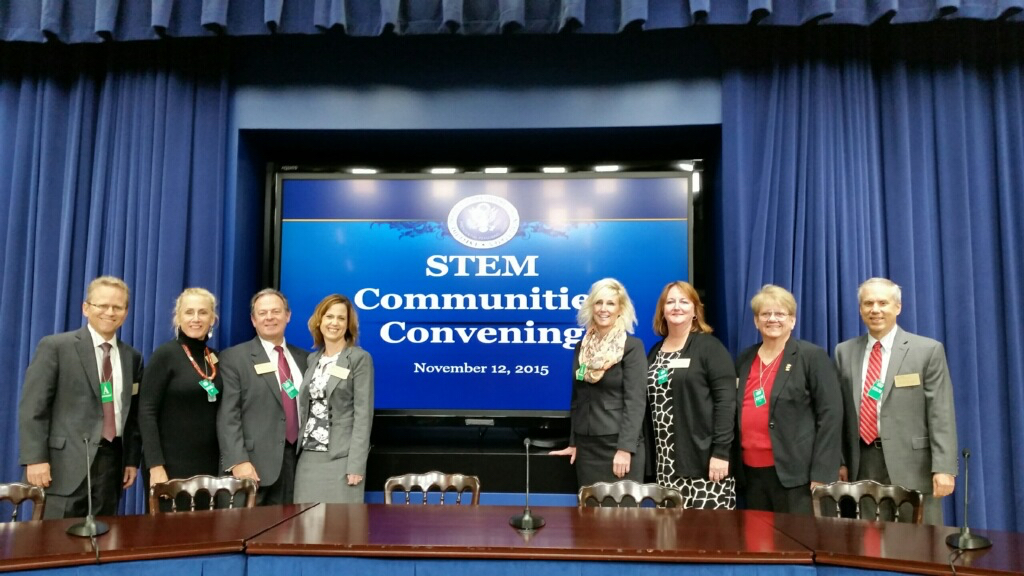 Leaders from 27 education groups that focus on the advancement of STEM subjects — otherwise known as science, technology, engineering and math — have gathered in Washington, D.C. this week to exchange strategies for building STEM education.
Leaders from 27 education groups that focus on the advancement of STEM subjects — otherwise known as science, technology, engineering and math — have gathered in Washington, D.C. this week to exchange strategies for building STEM education.
Specifically, they’re exploring ways to increase the number of STEM networks or ecosystems, which promote learning in these fields by fostering collaboration among schools, businesses and community organizations.
Making the trip to the nation’s capital were representatives from the OC STEM Initiative, which has become a model for a number of the STEM ecosystems popping up throughout the country. The local contingent also joined other education, business and community leaders in a meeting with White House officials to discuss equitable STEM education and federal STEM policy.
“American education is changing in order to help students succeed in the 21st-century economy,” said Dr. Jeff Hittenberger, chief academic officer for the Orange County Department of Education. “STEM learning empowers students to explore, innovate, think critically and solve problems in the real world. Educators, business partners, families and community members are partners in equipping students for success in college, career and life.”
Along with Dr. Hittenberger, the Orange County group included Dr. Christine Olmstead, OCDE’s assistant superintendent of instructional services; Dr. Linda Christopher, executive director of OC STEM; Paula Golden, president and executive director of the Broadcom Foundation and director of community affairs for Broadcom; Rick Singer, president and CEO of the Tiger Woods Foundation; Katherine Bihr, vice president of programs and education for the Tiger Woods Foundation; Michelle Freeman, program officer for the Samueli Foundation; Christina Altmayer, executive director of the Children and Families Commission of Orange County; Dr. CynDee Zandes, technical assistant for the STEM Ecosystem Initiative; and Gerald Solomon, who convened the gathering as co-chair of the STEM Funders Network and executive director of the Samueli Foundation.
The more than two dozen ecosystems selected to participate in this week’s event are receiving technical assistance and support from the STEM Funders Network, which has committed to producing 100 ecosystems in its first three years. Each ecosystem will be tasked with creating engaging, real-world STEM learning experiences in their communities.
“The president has called for all of us to think of creative and effective ways of getting all of our students engaged in STEM education,” said John Holdren, assistant to the president for science and technology — and director of the White House Office of Science and Technology Policy. “It’s heartening to see so many communities working locally and together in response to the President’s call to action.”
Ecosystem leaders also met with Harvard University student David Boone, who spoke to the group about the impact of real-world STEM experiences on his own path from homelessness to higher education. Boone benefited from Cleveland’s growing STEM ecosystem during his time at MC2 STEM High School.
“Collaborations like the Northeast Ohio Hub STEM Learning Ecosystem are helping to inspire and prepare students for success in STEM-related fields and in life,” said Ron Ottinger, executive director of the Noyce Foundation and co-chair of the STEM Funders Network. “We are delighted to help these regional coalitions advance STEM education around the country.”
“We look forward to continuing our work with communities nationwide,” added Solomon, the STEM Funders Network co-chair and executive director of the Samueli Foundation. “We know that these grassroots, local partnerships can provide a sustainable way to ensure STEM learning is truly ‘everywhere’ for all learners as they build the skills and knowledge to thrive in a global workforce.”
The first 27 STEM ecosystems selected by the STEM Funders Network are:
- Arizona SciTech Ecosystem (Phoenix, Ariz.)
- Bay Area STEM Ecosystem (San Jose, Calif.)
- BoSTEM (Boston, Mass.)
- Chicago STEM Pathways Cooperative (Chicago, Ill.)
- Colorado STEM (Denver, Colo.)
- East Syracuse Minoa Central School District STEM Learning Ecosystem (East Syracuse, N.Y.)
- ecosySTEM KC (Kansas City, Mo. and Kansas City, Kan.)
- EvanSTEM (Evanston, Ill.)
- Great Lakes Bay Regional STEM Initiative (Freeland, Mich.)
- Greater Austin STEM Ecosystem (Austin, Texas)
- Greater Cincinnati STEM Collaborative (Cincinnati, Ohio)
- Indiana STEM Ecosystem Initiative (Indianapolis, Ind.)
- Interdisciplinary Science and Engineering Partnership in Western New York (Buffalo, N.Y.)
- Los Angeles Regional STEM Hub (Los Angeles, Calif.)
- NC STEM Ecosystem: Driving the Future (Research Triangle Park, N.C.)
- Northeast Ohio STEM Learning Ecosystem (Cleveland, Ohio)
- NYC STEM Education Network (New York, N.Y.)
- Orange County STEM Initiative (Corona Del Mar, Calif.)
- Oregon’s Statewide Regional STEM Hub Network (Salem, Ore.)
- Pittsburgh Regional STEM Ecosystem (Pittsburgh, Pa.)
- Providence After School Alliance (PASA) AfterZone STEM – FUSE Initiative (Providence, R.I.)
- Queens 2020 (Corona, N.Y.)
- San Diego EcosySTEM (San Diego, Calif.)
- STEMcityPHL Regional Network (Greater Philadelphia, Pa.)
- Tampa Bay STEM Network (Tampa, Fla.)
- Tulsa Regional STEM Alliance (Tulsa, Okla.)
- Ventura County STEM Regional Network Learning Ecosystem (Camarillo, Calif.)
